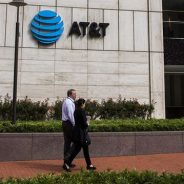Search results for :
Rotman Prof Talks MeToo Movement, and More – Toronto News
Professors and alumni from Toronto’s top business schools have been making headlines this week. See what they’ve been up to below.
The Corporate Climb: Women Locked Out of Old Boys’ Club in Misguided Me Too Backlash – Canada’s National Observer
The MeToo movement began as a way to shed light on the pervasiveness of sexual assault and harassment following the allegations against Hollywood power-producer Harvey Weinstein. Ideally, the MeToo movement would lead to more accountability for people in positions of power, and consequently, better boundaries in working and personal relationships. Unfortunately, progress often comes with backlash, which may be the case in Canada’s business world.
Instead of increased education about harassment and consent, many workplaces have taken to diminishing their liability via actions that hinder women. Because of this, some men in upper-level positions shy away from mentoring women or being in more intimate situations with them (e.g. a client dinner, or a business trip). However, Sarah Kaplan, professor at the University of Toronto’s Rotman School of Management, feels strongly that focusing on the backlash of the movement is counterproductive to the cause. In Canada’s National Observer, Kaplan says:
“It is just one more way that even an effort to lead to more liberation and equality has been co-opted. It is as if people don’t understand what they shouldn’t be doing. As long as you don’t grab someone or proposition them, you can take someone to lunch … It is completely obvious how to be professional.”
You can read more about the reaction to the MeToo movement here.
Tattoo Company Fosters a New Kind of Art – Ryerson Today
Braden Handley, a Ryerson University’s Ted Rogers School of Management Entrepreneurship graduate, co-founded Inkbox with his brother Tyler in 2015. Since then, the business has recently accrued $10 million CAD in funding. Inkbox offers semi-permanent tattoos made with organic materials, that last around two weeks.
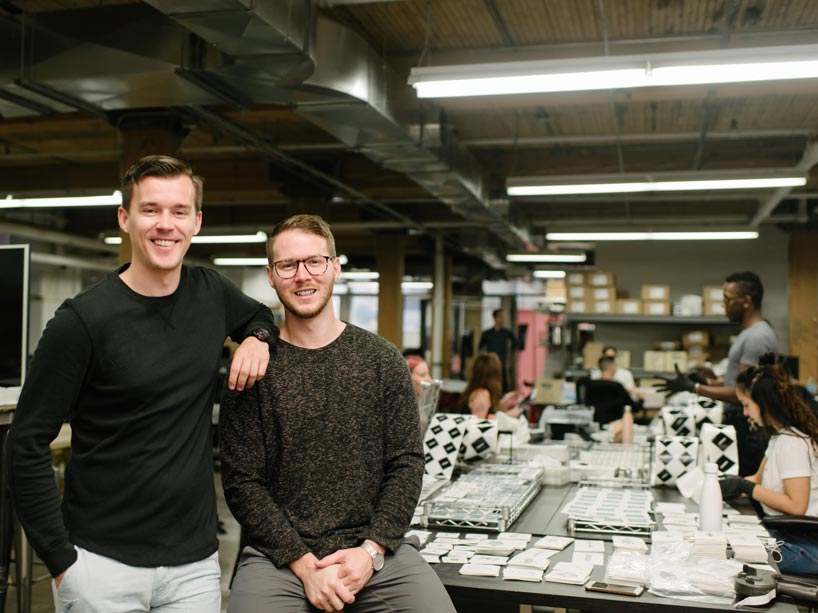
Braden Handley (left) with his brother Tyler / Photo via ryerson.ca
“Ryerson helped me get into work mode immediately,” Handley tells his alma mater in a recent interview. “You were taught how to be an employee … We were given a lot of assignments that were real work assignments.” The company employs 60 people, who contributing to the distribution of 60,000 tattoos per month.
“Chase your dreams, but your dreams have to align with your natural abilities as well. Everyone has predispositions and skills.”
Get more familiar with Handley’s journey here.
Top 100 Corporate Social Responsibility Influence Leaders – Assent Compliance
Assent Compliance’s new list of the “Top 100 Corporate Social Responsibility Leaders” has arrived. The ranking analyzes those whose “efforts contribute to improvements throughout global supply chains, helping individuals and companies make a positive difference.”
The list includes notable people like Laura Chapman Rubbo, who helped create the human rights policy for Disney.
Dirk Matten, Professor at York University’s Schulich School of Business, lands 44th on the list. Matten, who holds the Hewlett-Packard Chair in Corporate Social Responsibility, serves as Schulich’s Associate Dean of Research.
Discover the full list here.
Top MBA Recruiters: Fidelity Investments
When deciding to earn an MBA, you may have a lot of expectations. Whether you are more excited to build a professional network, gain industry-specific training, or develop leadership skills that can take your career to the next level, MBAs can certainly all agree on one thing they hope to get from their program: a job.
MBA graduates can feel more confident entering the job market knowing that top companies throughout the world are looking to recruit talent like them. To help find the perfect fit, MBAs might consider looking at employment reports from their school and other MBA programs around the world. This can help reveal some of the top companies in the country that are actively looking to recruit MBA talent to join the company.
One familiar company is Fidelity Investments, a multinational financial services with its headquarters in Boston, Massachusetts. Fidelity consistently makes the list of companies hiring MBA grads from some of the best business schools in the country, such as MIT’s Sloan School of Management. Originally founded in 1946, Fidelity today is the fourth largest asset manager in the world, with $2.4 trillion in assets.
Knowing that, how can you find Fidelity jobs that are right for you?
What is a Fidelity Career Like for MBAs?
Fidelity’s slogan is ‘blaze your own trail’, which probably explains why ambitious MBAs fit in well at the company. The company offers a number of ways for MBA grads to do so, whether through internships or full-time development programs. Whether graduates are interested technology, finance, investment, or business strategy, there are a variety of Fidelity jobs open for MBAs and MBA graduates.
Fidelity not only encourages their employees to blaze their “own trail,” but aims to create the perfect environment in which to do so. MBAs might be pleased to know the company has been recognized among the “50 Happiest Companies” by Career Bliss in 2018, and in 2017 it was recognized by the National Business Group on Health as one of the “Best Employers for Healthy Lifestyles,” and a “Best of the Best” by the National Business Inclusion Consortium.
Among the other benefits of working in a diverse and happy workplace like Fidelity, the average salary for employees with an MBA degree is $89,271, according to Payscale data. This can vary depending on the specific career path of each MBA, the highest being MBAs in Global Business Management, who make an average salary of $93,000 per year.
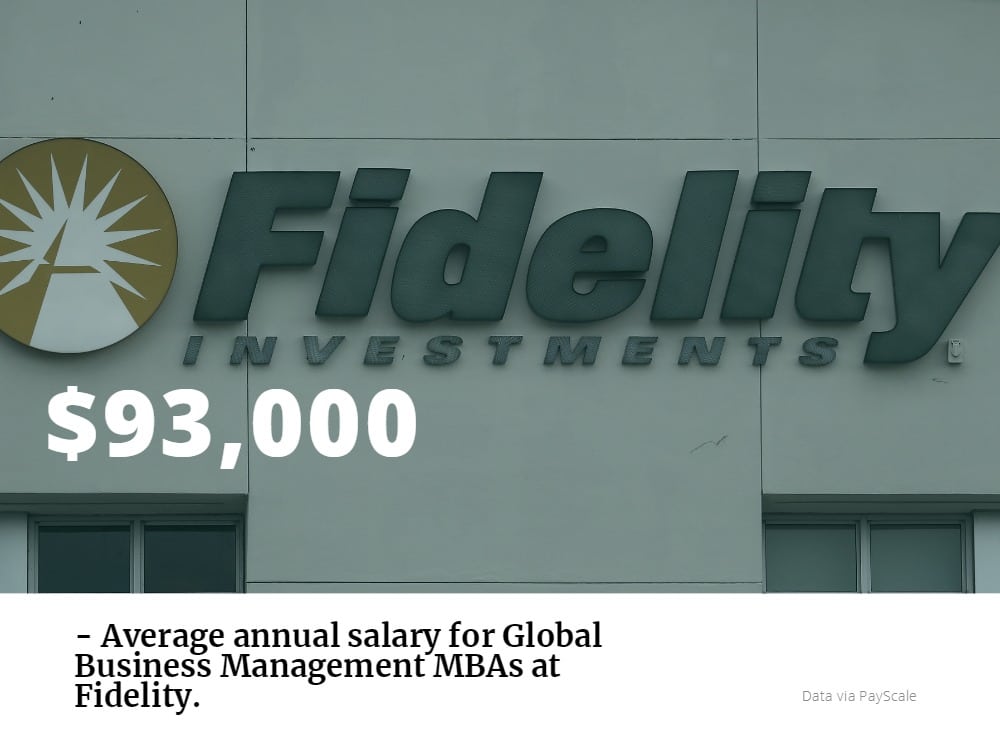
Several of the most prominent business schools in the country offer valuable Global Business Management MBA degree. Of which, include:
- The McDonough School of Business at Georgetown University
- The Fox School of Business at Temple University
- The Foster School of Business at the University of Washington (EMBA)
Starting the Fidelity Jobs Search
Fidelity demonstrates a commitment to hiring MBAs through an active recruitment program. The program includes Coffee Chats and Campus Presentations at business schools throughout the country. These visits give current students the chance to meet those currently doing the work that MBAs would likely do at the company, including Research Analysts, Directors of Research, and Portfolio Managers.
MBAs starting at Fidelity typically have two main career paths they will follow. Some may develop into a Portfolio Manager. Others may become a Career Sector Analyst. First round interviews typically occur on-campus, but special arrangements are made for students not on Fidelity’s campus recruitment schedule.
At Fidelity International, the company’s international investment subsidiary, there are additional opportunities for current MBAs to join the company as summer interns. The Equity Research Analyst Summer Internship is an 8-12 week global internship with opportunities in the UK, Hong Kong, Australia, Japan, Korea, Singapore, India, and China.
What Does Fidelity Look For in MBA Candidates?
When hiring MBAs for internships and development programs, Fidelity may have different needs and requirements for applicants depending on the specific field and career they seek. Hard skills tailored to your field of interest are necessary, however. Fidelity also looks for candidates with important soft skills like initiative, ambition, the ability to think independently, and keep cool under pressure.
Interested students can begin searching for Fidelity jobs on the official company website. Applicants should keep in mind the different opportunities available for those currently in an MBA program, near completion, and post-graduation.
Government Cyberattacks, the Perception of Lies, and More – Chicago News
Let’s explore some of the most interesting stories that have emerged from Chicago business schools this week.
How Governments Can Better Defend Themselves Against Cyberattacks – Kellogg Insights
Northwestern Kellogg Managerial Economics and Decision Sciences Professor Sandeep Baliga recently co-authored new research with University of Chicago’s Ethan Bueno de Mesquita and MIT’s Alexander Wolitzky, which articulates a new theory about how victims of cyber aggression might choose to retaliate—or not—against shadowy aggressors.
Baliga explains that their model presents a theory that “cyber warfare is inherently multilateral.”
“If the standard of proof is satisfied, yeah, then you should react super aggressively. But when there’s a lot of noise, you might actually want to back off because others may exploit your policy by hiding behind misidentification. If somebody wants to trigger a war between us and China, then they have every reason to do a hack that looks like China did it.”
Baliga adds, “If nations get better at both detecting attacks and identifying their perpetrators, then cyber peace is more likely to prevail.”
You can read the full article on the future of government cyberattacks here.
New Study Finds When Telling Lies, Perception Matters – Booth News
Chicago Booth Assistant Professor Emma Levine recently co-authored new research with UCLA Anderson’s Adam Eric Greenberg and Deakin University’s Matthew Lupoli that finds that “well-intentioned lies can spark strong resentment from the person who is deceived.”
In other words, “Telling a lie in order to help or protect someone—a practice known as prosocial lying—backfires if the person being lied to perceives the lie as paternalistic,” meaning lies that require the “liar to make assumptions about whether lying is in the deceived party’s best interest.”

Photo via newschicagobooth.uchicago.edu
Levine explains the trio’s findings, which were published as part of a paper entitled “Paternalistic Lies” in Organizational Behavior and Human Decision Processes:
“We sometimes tell lies to others believing that they will help, when in reality we are acting upon a paternalistic assumption that lying is better than the truth. Our research demonstrates that in these situations, the individual on the receiving end is likely to resent deception.”
You can read more about the research here.
Faculty Focused on Workplace Wellness Continue to Steer the Discussion – Gies College of Business News
Gies College of Business Assistant Professors of Finance David Molitor and Julian Reif co-authored The Illinois Workplace Wellness Study, whose results examine the efficacy of a homegrown wellness program.
According to the website, “The study’s findings will empower employers, public health professionals, and policymakers to make more informed decisions regarding the implementation of workplace wellness programs throughout the United States.”
You can find more here.
The Newest Fordham EMBA, and More – New York News
Let’s explore some of the most interesting stories that have emerged from New York business schools this week.
New EMBA Program Prepares Athletes and Artists for Second Careers – Gabelli Connect
Earlier this month, the Fordham Univesity Gabelli School of Business unveiled a new EMBA program that caters to athletes and artists. Associate Dean Francis Petit, who will preside over the new program, writes about the specific segment the EMBA will service:
“Overall, this segment is looking to reinvent themselves and reinvention is oftentimes arduous. This program will provide the necessary tools.”
Petit compares the collective and collaborative academic journey that participants will take to the experiences athletes had among their teammates.
According to the article, the new EMBA will include “team projects, career coaching, presentations, and site visits to companies in the New York area, along with a capstone project.”
You can read more about the new Gabelli EMBA program here.
What Everyone Needs to Know When Traveling Abroad – Columbia Business School News
New research co-authored by Columbia Business School’s Michael Morris explores the question of how far should you go to “adopt local ways when your work brings you abroad?”
Not surprisingly, Morris’s paper “Do As the Romans Do? Diversity Ideologies and Trust in Evaluations of Cultural Accommodation” finds that the answer is complicated.
“If you’re wondering whether to try to speak limited Spanish in Barcelona or say ‘G-Day’ in Sydney, the answer is a yes. Accommodate to a moderate extent and locals will appreciate the gesture,” he writes. “Visitors need to be careful not to overdo it, since going too far can cause a backlash. This research sends the simple message to foreign visitors that effort matters. It’s a sign of respect and authenticity.”
You can read more of Morris’ advice here.
The Secret to Influential Management Research? It All Comes Down to Data – Stevens Institute of Technology School of Business News
The Stevens Institute of Technology School of Business recently profiled Emeritus Professor Dr. Richard Reilly, whose pioneering work in talent management research was honed during a distinguished career designing studies at Bell Labs, AT&T, and ETS. The article notes that Dr. Reilly was “recognized by Academy of Management Learning and Education as being among the top 1 percent of all researchers in human resource management and strategy, as measured by textbook citations.”
Dr. Reilly notes, “Understanding these organizations and how they work gave me access to data that helped me do meaningful research, write articles and teach to what was actually going on in the workplace.”
Dr. Reilly explains one of the impetuses for his research:
“The issue with testing is that the outcome in higher education is so much harder to pin down. Is it grades, or something more nuanced, more complex? I got interested in looking in the issues around fairness in tests, as it relates to gender and background.”
You can read more about Dr. Reilly here.
Curbing the Conspiracy Mindset at Northwestern, and More – Chicago News
Let’s explore some of the most interesting stories that have emerged from Chicago business schools this week.
Conspiracy Theories Abound. Here’s How to Curb Their Allure – Kellogg Insight
Northwestern Kellogg Clinical Professor of Management and Organizations Cynthia Wang took a social psychological approach to understand what drives conspiratorial perceptions like Pizzagate, and “what are things that can be done by organizations that can prevent this mindset,” highlighted in a recent release from Kellogg Insight.
Wang co-authored a new paper with UCLA’s Jennifer Whitson, Penn State-Erie’s Joongseo Kim, Ohio State’s Tanya Menon, and Ball State’s Brian Webster, which finds that “individuals who exhibit a desire to take action in pursuit of their goals are less prone to conspiratorial thinking.”
The group began to focus on “regulatory focus theory (RFT), which looks at how people go about achieving their goals.” Kellogg Insight explains:
“RFT proposes two main strategies. People with a “promotion-focused” orientation aim to do everything in their power to achieve their hopes and dreams. In this mindset, individuals believe they can shape their future, suggesting that they feel a high degree of control over their environment. Those with a “prevention-focused” orientation, on the other hand, act diligently to protect the security they already have.
The researchers hypothesized that prevention-focused people might be more prone to believe conspiracy theories because conspiracies can feel like a threat to their security. The team suspected that people with a promotion focus, however, would be more skeptical.“
The team surveyed three groups of people, including military personnel and college students. Consistently, they found that people who were more “promotion” focused thought they had more agency in what happens to them, and therefore more control. In this frame of mind, those that felt they had more control were less susceptible to believe conspiracy theories.
You can read more about the group’s research here.
Yuxuan Tang is Ready for His 48 Hours of Fame – Gies School of Business Blog
Gies College of Business senior Yuxuan Tang was one of four University of Illinois students drawn from the Illinois MakerLab and selected to compete in Season 3 of the PBS show Make 48, a “televised national invention competition that gives teams 48 hours to come up with an idea, create a prototype, and present their idea to a panel of judges.”
Tang writes, “It’s an honor. The competition is like a sped-up creation process. Being able to make the model is important, but the rest of the team should diversify. You need some people to see ‘How’s the market? What do customers think of this service?’ That’s what business people do.”
You can read more about Tang’s work here.
Graduate Students Tackle Issue of Clean Water in Haiti – Quinlan School of Business Blog
Loyola’s Masters of Social Justice student Josh Goralski spoke with the Quinlan School of Business Blog about his social enterprise, which “focuses on building water filtration businesses [in Haiti] funded through micro-financing.”
This idea is an extension of a business idea he and his undergraduate classmates at Rockhurst University developed to address the 5,700 Haitians water-related diseases claim each year. According to the article, “52.4 percent of Haiti’s rural population does not have access to clean water.”

Loyola student Josh Goralski, pictured in Haiti / Photo via luc.edu
“Water filters would be sold by local community members. The sellers would be trained and certified to micro-finance the filters affordably for their community members.” According to the article, the ceramic water filter that the Haitian water enterprises sell can “provide clean water for a family of five for up to 10 years with little maintenance, and save families $400+ USD over 10 years.”
Goralski writes that his goal is to “empower communities. We wondered, how do we work with a local community partner, provide access to business education training, and empower these communities?”
You can can read more about Goralski’s work here.
Top MBA Recruiters: AT&T
Finding employment after graduating from an MBA program can be a challenge for some. Thankfully, new MBAs are never alone in the process. From companies that actively recruit talent from business schools throughout the country, to MBA programs themselves helping to facilitate interviews and job referrals for their students, students should be sure to take advantage of resources available to them.
A look at 2017 employment data from a top MBA program like the University of Chicago’s Booth School of Business reveals the overwhelming trend: a whopping 89.2 percent of students found employment through university-facilitated avenues, be it on-campus recruitment and interviews, networking events, or through a Booth-facilitated summer employer. The success of campus recruitment benefits everyone, not only because universities are willing to open their doors and advocate for their students, but because top companies go out of their way to recruit young talent and create opportunities for them.
One such company is American multinational telecommunications holding company, AT&T. Founded in 1983 as the Southwestern Bell Telephone Company—part of the Bell Telephone Company with roots in the late 19th century—today AT&T has more than 254,000 employees worldwide and $190 billion in revenue. With a commitment to MBA graduates through internships and early career development programs, AT&T makes the grade as a top recruiter and employment destination for MBAs.
What Is An AT&T Career Like for MBAs?
It should be no surprise that MBAs love working at AT&T when you know the kind of investment this company makes in the educational development of its employees. In 2016, AT&T spent $250 million on employee training and invested roughly 20 million hours into the process. With so many opportunities for ambitious team members to accelerate their careers through leadership and development programs, this is the perfect company for those looking to quickly rise into leadership roles.
AT&T has been awarded many times for its workplace culture, including being named on Fortune‘s ‘100 Best Companies to Work for in 2018‘ and 3rd overall on the Diversity Inc. list of the ‘Top 50 Companies for Diversity‘ in 2018.
Of course, it pays to have an AT&T career, even beyond a positive workplace culture. According to PayScale data, MBA graduates at AT&T earn an average annual salary over $95,000. This can range as high as $142,000 for those in operations management. Employees, including interns, are rewarded with competitive compensation and benefits, including paid holidays, time off, and discounts for AT&T products.
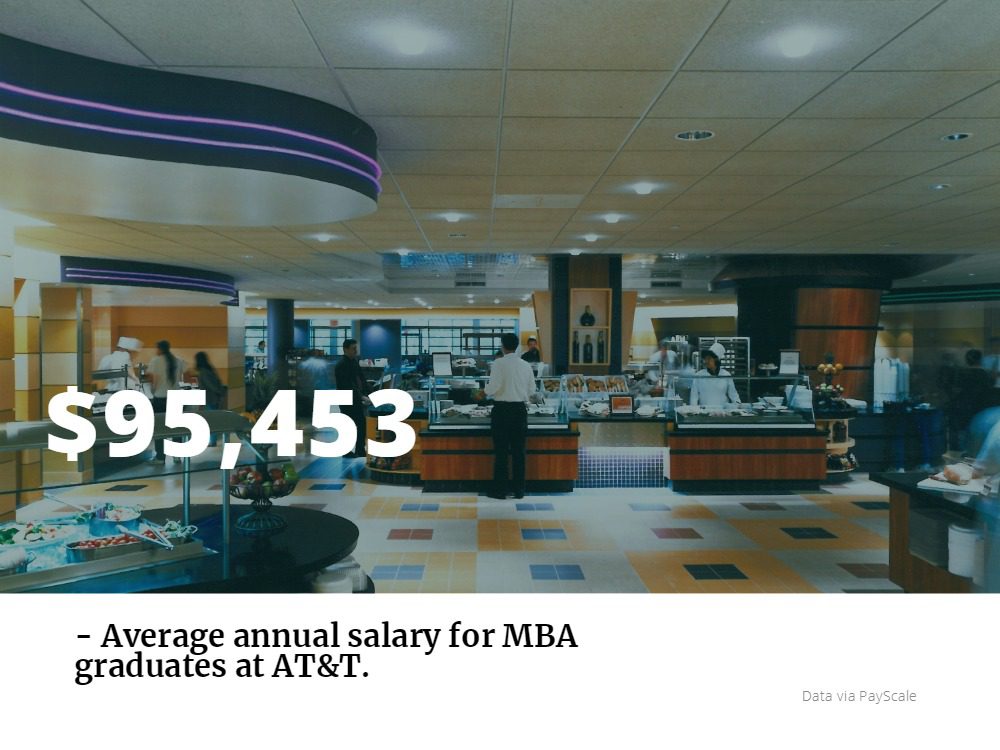
Getting Started
MBA students interested in starting an AT&T career should keep an eye out for the various recruitment events set up through their university, where they can apply on campus and may be selected to interview with college recruiting managers. Because of the company’s heavy investment in a diverse workforce, AT&T also has a strong presence at recruitment conferences like the Forté Foundation for female business leaders, Reaching Out MBA for LGBT candidates, and the National Black MBA Association (NBMBAA).
Many MBAs start their AT&T career through its many internship opportunities, which are found at locations throughout the country and typically last 10-12 weeks. AT&T offers these paid internships a huge variety of fields, such as data analytics, cybersecurity, entertainment group technology, software development, and leadership, among others.
In addition to internships, MBA graduates may apply for one of the many AT&T career development programs. These are full-time, paid rotational programs that may last anywhere from two to three years, providing hands-on experience, exposure and opportunity. Development programs at AT&T include:
- B2B Sales
- Cybersecurity Development
- Engineering and Operations Development
- Finance Leadership Development
- Leadership Development
- Software Development
What Does AT&T Look for in MBA Candidates?
When hiring for its MBA internships and development programs, AT&T looks for students with at least three years of professional experience with the ability to collaborate on complex issues and thrive in a leadership role. The company seeks candidates who are passionate about the role technology can play in people’s lives and its capacity to transform.
In addition to the internships and early career programs, AT&T also looks for more experienced MBA holders for higher-level executive and management positions. For these roles, the company seeks candidates with at least five to eight years in experience related to the role with the ability to work in a team, be a self-starter, and think critically.
Are Business School Neighborhoods Becoming More Gentrified?
When universities are found in downtown urban areas, gentrification most often follows. It almost seems inevitable since universities bring in more individuals with higher education, draw in more money, and increase new businesses. But what does the rapid increase of gentrification statistics mean for the business school students looking to start their career in a new area?
What Is Gentrification?
First, we need to look at what gentrification is. In simple terms, it’s the influx of more affluent residents moving into urbanized neighborhoods. At the outset, it may sound good, but it can be controversial.
Gentrification may improve the financial quality of a neighborhood, but it can also force the relocation of current residents and businesses due to increasing costs. Often, the process of gentrification also shifts a neighborhood’s racial and ethnic composition, as well as the average household income. This can lead to community displacement for lower-income families in gentrified areas, some of which often live in the area for several generations.
However, there is a grey area. Gentrification happens when a location becomes increasingly attractive. At that point, more high-income individuals move into the area bringing in investments in the community and leading to improved infrastructure and economic development.
What Causes Gentrification?
According to a recent comprehensive review of gentrification completed by researchers at UC Berkeley and UCLA, gentrification most often occurs when more public transportation is available. People are more attracted to transit hubs because they allow more privileged groups to trade car commutes for transit and signal a large-scale commitment to neighborhood upgrading, which, in turn, leads to increased employment opportunities.
Another spur to gentrification is education. Quality schools, universities, colleges, and medical centers tend to shape gentrification. The substantial federal support that public universities receive brings money into neighborhoods through many means including housing and housing subsidies for faculty and staff. A CityLab study revealed that universities and other academic institutions are key to attracting the creative class, creating more market demand and political pressure for better amenities, schools, and other services.
Analyzing University Neighborhood Gentrification Statistics
Since universities have such an impact on gentrification, we thought we’d take a look at what areas and schools have been most affected. While gentrification is not something most urban areas should aspire for, it happens, and it’s important to know where it’s occurring the most.
To find out, we looked at a recent study by RentCafe of the most gentrified areas in the U.S. The study took a look at the 2000 Census and the 2016 American Community Survey to see the changes that took place over a decade and a half across 1,000 U.S. ZIP codes. The study found that there are easy ways to quantify gentrification statistics when looking at median home value, median household income, and the population that holds a bachelor’s or higher degree.
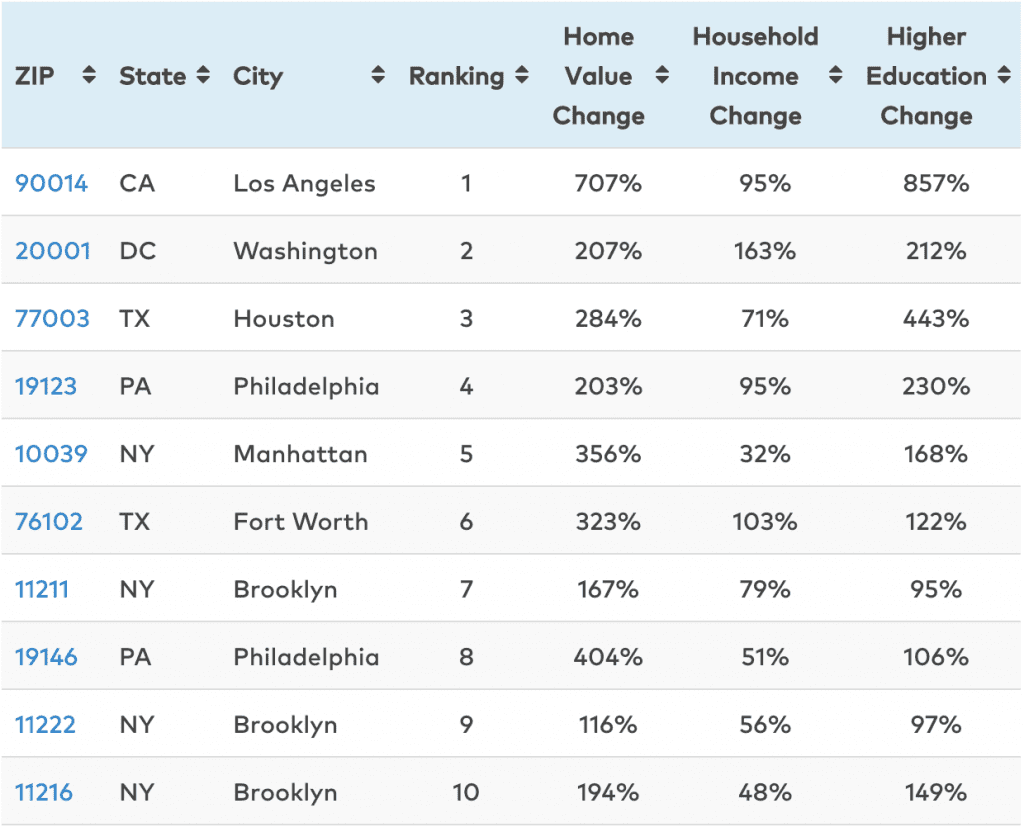
Based on the results of the study, we analyzed the top five MetroMBA universities in gentrified areas.
-
University of Southern California
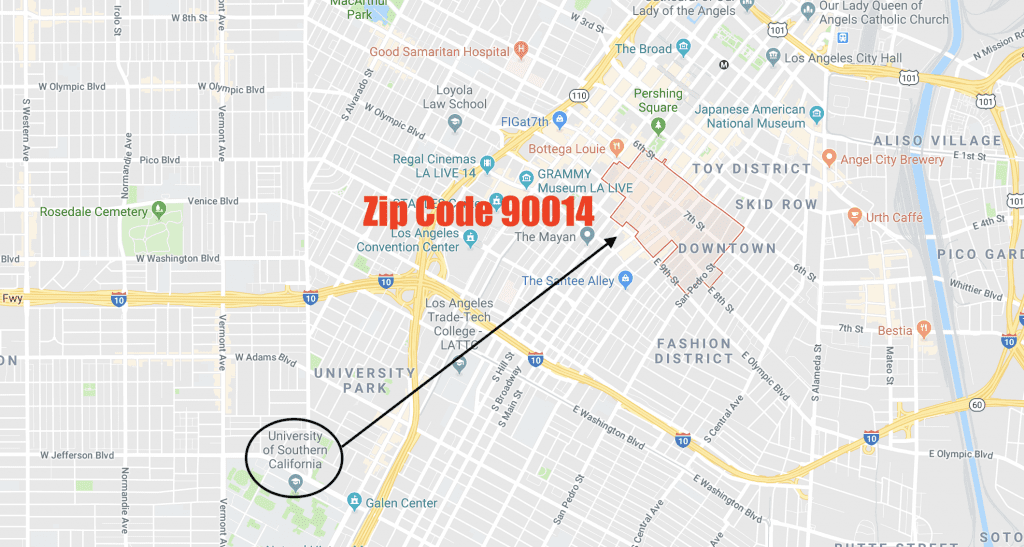
Located less than five miles away from ZIP code 90014 in Los Angeles, USC Marshall is just on the edge of the most gentrified area in the U.S. Over the last 16 years, this area has witnessed:
- A 707 percent increase in home values
- A 95 percent increase in median household income
- And an 857 percent increase in people holding bachelors or higher degrees
So, while some at USC might be fighting gentrification, it may not be working. Just last year, USC opened up a brand-new $700 million USC Village with a Target Express, Trader Joe’s, and 15 restaurants, transforming the surrounding neighborhood. And even though as part of the development USC provided $20 million for construction of off-site subsidized housing, there are still concerns.
“Across the street, land values are going to increase,” Joe Donlin, Associate Director of Strategic Actions for a Just Economy, told KPCC. “We know the landlords are going to rent at higher levels of rent.”
-
Howard University
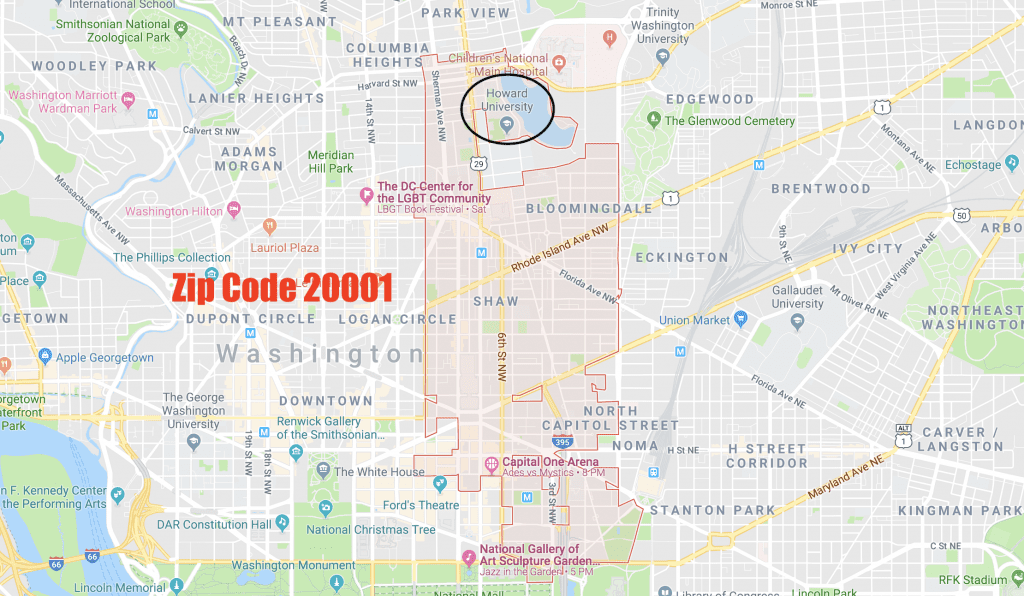
Located in Washington, D.C. Zip Code 20001, Howard University’s campus is located directly in the second most gentrified area in the U.S. Over 16 years, the area has witnessed:
- A 207 percent increase in home values
- A 163 percent increase in median household income
- And a 212 percent increase in people holding bachelors or higher degrees
The gentrification statistics of the Howard University area hasn’t gone unnoticed. According to NPR, there has been a drastic change:
“The area, located just a couple of miles north of Capitol Hill, was once working-class and black. But as hundreds of new residents move to D.C. each month, more non-black residents move into Howard’s neighborhood. And as property values rise, the university is trying to capitalize on the hot real estate market.”
-
University of Houston — Downtown
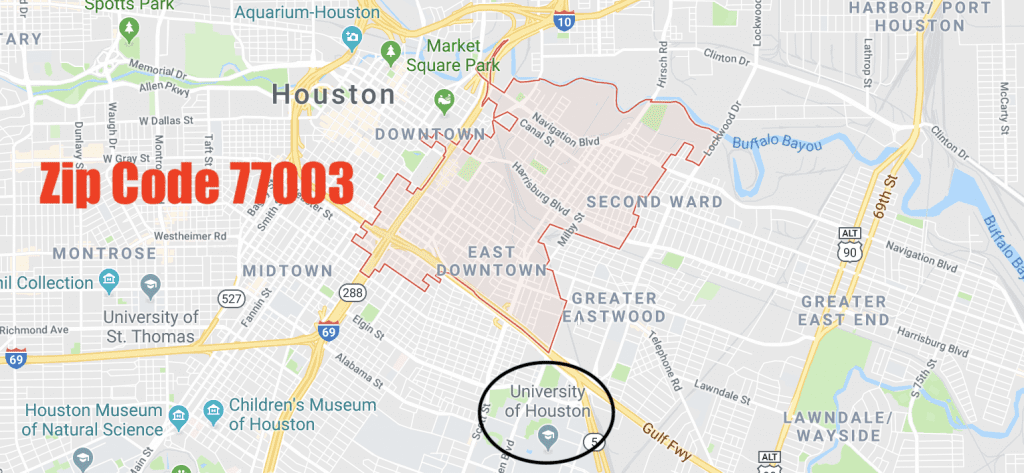
Located just steps away from zip code 77003, The University of Houston campus is located near the third most gentrified area in the U.S. In the last decade and a half, the area has seen:
- A 284 percent increase in home values
- A 71 percent increase in median household income
- And a 443 percent increase in people holding bachelors or higher degrees
Much of the gentrification can be laid at the university’s feet as its student housing footprint has expanded into surrounding neighborhoods over the last decades. According to the Houston Chronicle, “In the portion of the neighborhood closest to downtown, which includes Emancipation Park, median home values increased 176 percent between 2000 and 2013, according to an analysis of census estimates conducted by Governing.”
-
University of Pennsylvania
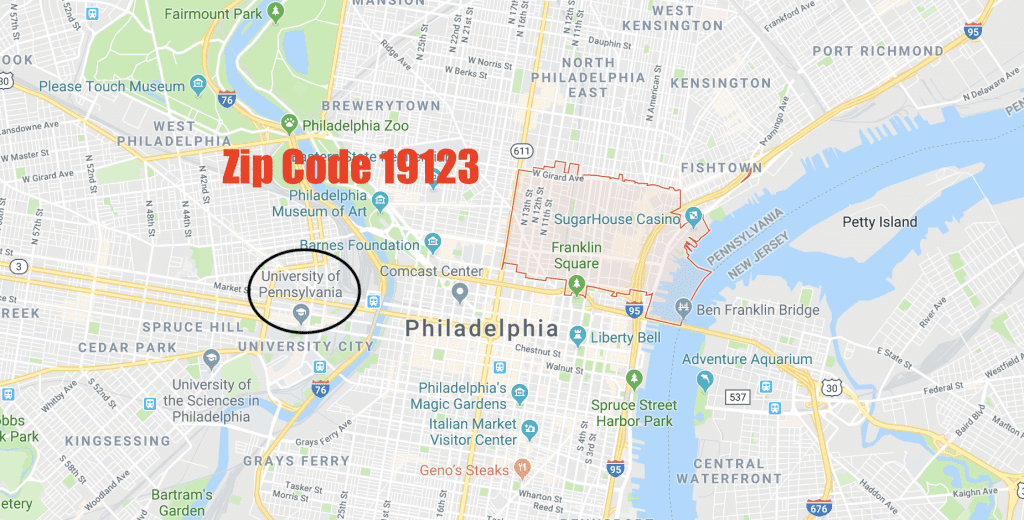
The Wharton School at UPenn is less than five miles outside the fourth most gentrified neighborhood in the country: zip code 19123. This area, over the last 16 years, has noticed:
- A 203 percent increase in home values
- A 95 percent increase in median household income
- And a 230 percent increase in people holding bachelors or higher degrees.
In fact, UPenn has had a complicated history with gentrification over the years, dubbed Penntrification by some. The problem, according to The Daily Pennsylvania, is that in West Philadelphia Penn students’ demand for housing is displacing low-income families. There have even been protests criticizing the university for causing gentrification in the area.
-
Texas Christian University

Fort Worth, TX, contains the sixth most gentrified area in the U.S.; just two miles away from Texas Christian University (TCU). Over 16 years, the area has witnessed:
- A 323 percent increase in home values
- A 103 percent increase in median household income
- And a 122 percent increase in people holding bachelors or higher degrees
While Fort Worth’s growth has brought new life to the city’s urban core, it’s also sky-rocketed property values. In particular, the areas around TCU are growing quickly. The university recently completed a $100 million renovation for its football stadium—just five years after its last overhaul, which reportedly cost $164 million.
MIT Sloan Celebrates 4th Annual Women’s Week in 7 Cities Worldwide
The MIT Sloan School of Management’s #MITSloanWomen campaign just celebrated its fourth anniversary. One of the cornerstone events of the campaign, which offers female prospective applicants and current MBA students new ways to interact with the school and build their post-graduation careers, is the annual Women’s Week.
Since 2014, Women’s Week has brought female MIT Sloan alumnae and the Sloan admissions team to cities across the United States and abroad to interact with women interested in the Sloan MBA. The events are designed specifically for female MBA applicants and offer deep-dives into what it means to be a Sloan woman.
“Women’s Week is a great chance to hear stories from MIT Sloan female alumnae who are making an impact,” explained Shauna LaFauci Barry, the associate director of admissions at MIT Sloan. “It is a unique opportunity to network with a community of women who are exploring the MBA.”
Women’s Week took place this past July in seven cities around the world: Washington, DC; Cambridge, MA; San Francisco, Chicago, Seattle, New York City, and London. Women gathered at each location to enjoy a featured TIMTalk (Think. Inspire. Motivate), as well as a panel of local female alumnae from the two-year MBA, Sloan Fellows MBA, and Executive MBA programs.
The events were a resounding success.
“This year’s events surpassed 1,000 women registered,” explained Barry. “There were 1,600 registrants for over seven events including one live stream. This even included two new cities: Seattle and London.”

To learn more about the success of Women’s Week and what it was like to attend, we reached out to Shauna LaFauci Barry for an in-depth chat.
Women’s Week 2018 Theme
The theme of this year’s events was “MIT Sloan Women: Creating Ideas Made to Matter,” and their focus was on celebrating Sloan women who are making an impact.
According to Barry, all of the alumnae panelists were “incredibly accomplished, articulate, thoughtful, [and] authentic. Each one brought something unique to the event. We were so grateful to have such great MIT Sloan Women Ambassadors.”
Meet the San Francisco Women’s Week TIMTalk Speaker
Barry was particularly impressed by Sephora Innovation Lab Senior Manager Nelly Mensah (MBA ’15), the San Francisco’s TIMTalk speaker. In her talk, Mensah discussed the importance of creativity, collaboration, and being value-driven.
“I am still singing her praises in my mind,” said Barry. “She was agile and adaptable. When my computer started rebooting right before her slide presentation, she rolled with everything. She brought a great sense of humor to her talk—a vulnerability and honesty on the importance of creating a culture at Sephora Innovation Labs where innovation ripples through.”
Mensah tied everything in her talk into the culture of MIT Sloan, her activities while in school (Retail Club, internship in Milan, etc.), and how they contributed to where she is now. There were three key takeaways:
- Cross-Cultural Collaboration: At MIT Sloan, Mensah was part of the Hacking Arts. Now, she runs Hackathons at Sephora.
- Creating Space and Time for Creativity: There is always an opportunity to be creative; make time for it and make sure you get input from people throughout the organization.
- Be Value-Driven: Sephora feels strongly about their value of empowering women, and all of their activities align with this (i.e. Women Who Code).
Women’s Week Takeaway
Barry explained what she hoped attendees would take away from not just the San Francisco event, but every Women’s Week event. “We want them to be energized about their own ideas and to see how an MBA from MIT Sloan can help them achieve their goals,” she said. “We want them to learn something new and come away from the event wanting to explore more.”
Why Women’s Week?
Here are just a few reasons why a prospective female MBA candidate should attend next year’s MIT Sloan Women’s Week:
- It offers excellent exposure to a variety of stories from MBA women at various stages of their careers.
- It showcases how the MIT Sloan MBA has served as a gateway to making women’s ideas matter.
- It inspires attendees to imagine what might be possible in their future.

Coming Soon
Fret not if you missed this year’s Women’s Week. You still have a chance to attend a few female-focused events by registering for one of MIT Sloan’s Women’s Ambassadors Days this fall. The first event, MBA Women’s Visit Day, occurs on October 12 and will feature faculty member Gita Rao discussing finance and action learning at MIT Sloan. You can register here.
Other events include the Women’s Ambassadors visits, which allow women to come to class for an on-campus visit, attend a class, and join a member of the Admissions Office for a presentation about the school.
- October 29: MBA Women’s Ambassadors Program Morning Visit
- October 29: MBA Women’s Ambassadors Program Afternoon Visit
- November 19: MBA Women’s Ambassadors Program Morning Visit
- November 19: MBA Women’s Ambassadors Program Afternoon Visit
- December 6: MBA Women’s Ambassadors Program Morning Visit
- December 6: MBA Women’s Ambassadors Program Afternoon Visit
Kellogg Launches ‘Ask an Admissions Officer’ Initiative on Social Media
Are you curious about the Northwestern University Kellogg admissions process? Do you want to know if it’s better to apply in one round or another, what the committee is looking for, or how you can apply to more than one program at a time? Kellogg’s new social media initiative, “Ask an Admissions Officer,” offers answers to these burning questions and more.
“Simply put, we are giving people an opportunity to send us questions via Instagram direct message (DM),” explains Kellogg Communication Specialist Rebecca Rogalski.
“Then, our social team is going to collect the best and most frequently asked questions, creating a short series of videos with the Kellogg admissions officers answering those questions.”
Kellogg applicants who want to submit their questions over the next week should do the following:
- Follow @KelloggSchool on Instagram.
- Send the school a question via direct message.
- Check back in early August to see if your question was answered.

This is an ideal opportunity for Kellogg hopefuls to get answers to all their burning questions before the Round 1 deadline on September 19, 2018.
Pro tip: Before you submit your question to Instagram, make sure it doesn’t have an answer that can be easily found on the Kellogg website. We suggest checking the Admission Facts & Tips section first if you need intel on …
- The best time to apply
- Deferrals
- Applying with a partner
- Work experience recommendations
You can also check out last year’s Clear Admit post where Kellogg’s Director of Admissions for the full-time MBA and MSMS Programs Melissa Rapp discussed application essays, female enrollment, and more.
Remember to stay tuned later this month for the Kellogg admissions team to provide video answers to the most frequently asked questions.
This article has been edited and republished with permissions from our sister site, Clear Admit.
Where Have All the New Ideas Gone? – Boston News
Let’s explore some of the most interesting stories that have emerged from Boston business schools this week.
New Ideas are Getting Harder to Find—and More Expensive – MIT Sloan Newsroom
MIT Sloan recently examined just how difficult is it to come up with new ideas in an age of seemingly infinite access.
A new National Bureau of Economic Research study published by MIT Sloan Professor of Applied Economics John Van Reenen, Stanford University professors Nicholas Bloom and Charles I. Jones, and Stanford Doctoral candidate Michael Webb finds that “the productivity of scientific research is falling sharply across the board” due in large part because “researchers are putting in more and more effort to sustain the same—or even a slightly lower—pace of idea generation as we experienced half a century ago.”
Van Reenen writes, “As the total amount of knowledge becomes larger and larger and larger, it becomes increasingly difficult to get to its frontier of that knowledge. It was much easier a couple thousand years ago.”
Two workarounds are to narrow the “focus of one’s studies to specialize in a very particular domain” and expand investment into research. However, both solutions arrive with their own sets of challenges, according to Van Reenan.
“In order to carry on innovating, you’re constantly working together, and it’s very complicated to get all of these people and ideas together.”
Van Reenan is concerned that government investment into scientific research is simply not enough of a high priority.
“I think a lot of the time you hear we’ll just cut the top tax rates to generate lots of innovation — I’m pretty skeptical about that in terms of the incentives you’re going to give. Both have positive effects on growth and equality. Instead of giving away $5 trillion in tax cuts, use that to invest in growth opportunities for the future.”
You can read the full article from MIT Sloan here.
No More General Tso’s? A Threat to ‘Knowledge Recombination’ – Harvard Business Week
HBS Technology and Operations Management Unit Assistant Professor Prithwiraj “Raj” Choudhury is set to publish a new Strategic Management Journal paper that explores the “role ethnic migrants play within the work force,” as well as the “new technologies in countries where they’ve migrated.”
Choudhury points to examples throughout history like Soviet mathematicians who “came to the United States in the 1990s after the fall of the Soviet Union; far ahead in fields like partial differential equations and symplectic topology, they helped their American counterparts solve otherwise intractable problems,” American Chinese cuisine staples like General Tso’s chicken and chop suey, and Indian immigrants who brought double-entry bookkeeping to South Africa in the late 19th century.
Choudhury uses ‘The Ethnic Migrant Inventor Effect: Codification and Recombination of Knowledge Across Borders,’ written with HBS doctoral student Do Yoon Kim, as a launch pad to discuss immigration through the lens of knowledge production rather than job creation—or absorption.
“Instead of seeing migrants through the lens of whether they create jobs or not, we should view migrants as carriers of knowledge—knowledge that could be further recombined by locals. If H1-B was scrapped, or Europe stopped admitting skilled migrants, the knowledge production of the global economy would suffer.”
Choudhury adds, “It’s not only a loss to the firms, it’s also a loss to local workers, who will lose out if they do not imbibe this knowledge from migrants. I would turn the debate on its head and say, it’s not about destroying or creating jobs, it’s about participating in or losing out on creating knowledge.”
You can read the full article here.
Coffee Break – Sawyer Business School
MassChallenge, the self-described “most friendly start-up accelerator on the planet” recently selected WarmUp Protein Coffee, a “coffee-cum-protein beverage” developed by Sawyer Business School alum James Testa (BSBA ’17) as part of Sawyer’s “Crowdfunding the Venture” class.
Testa writes about how getting rejected from last year’s competition sent him back to the drawing board and enabled WarmUp to stand out among the other 1,600 applications. In a recent interview with his alma mater, Testa says:
“I spent all year getting the product out there, building the business, and getting some sales. So when I went back to MassChallenge this year, I feel like I had a much better grasp of my business and who my customers were. And because I had real sales, I was a lot more confident about it. The proof of concept was already there.”
MassChallenge start-ups “get free office space, connections to industry-specific mentors, advice from venture capitalists, and the chance to win up to $1.5 million to help launch a business.”
You can read the full article here.
New MBA Jobs: Morgan Stanley, Google, Nike, and More
Every MBA’s goal is to land their dream job, but why limit your choices to the United States? With so many great companies recruiting MBAs to develop businesses in markets across the globe, it’s hard to stay on top of all the opportunities out there. Here’s a selection of some of the most exciting open positions out there right now in the US, Europe and Asia: Continue reading…
MBA Recruiter: Starting Your MBA Career with Cisco Systems
Cisco Systems, a leader in computer networking, is constantly looking for MBA talent. Founded in 1984 by two computer scientists from Stanford University who sought an easier way to connect different types of computer systems, the multinational corporation now hires MBAs from top business school across the country. Continue reading…
What Exactly is the “Target Effect”? NYU Stern Prof Looks Deeper – New York News
Let’s explore some of the most interesting stories that have emerged from New York business schools this week.
Why It’s So Hard To Buy “Just One Thing” At Target – Refinery29
Speaking with Refinery29 writer Cait Munro, New York University’s Stern School of Business marketing professor Tom Meyvis elaborated why consumers have such a strong impulse to buy more things than they intended when shopping at a big-box store.
“Stores have an idea about the path [shoppers take],” he says in an interview. “Walmart was once famous for doing things like putting like Band-Aids next to fishing hooks and things like that. Something you don’t naturally associate, but once you see them there, it makes sense. So when people come in for something in one category, you can cross-sell, you can sell them something that compliments in the next product category by making sure they’re right next to each other.”

What is the so-called “Target Effect” that makes people buy more products than they intend to?
“Meyvis also notes that stores like Target have extensive data on which products customers typically buy together, and they’ll often employ those numbers to decide what should go where within the store’s layout. Some are obvious, like placing flip flops next to sunscreen, while others are so subtle that you might not even notice what’s going on when you pick up hot sauce and Pepto Bismol in the same motion.”
You can read more of Munro’s piece with Refinery29 here.
A Masters in Governmental Accounting? Five Reasons It’s Time to Make the Investment – Rutgers Business School Blog
Offered completely online, the Rutgers Business School Master of Accountancy in Governmental Accounting program may be perfect for working professionals “in the field of public financial management or transition to the public sector from private industry.” The school outlines five the biggest reasons why you may need to consider it, too:
- Opportunities – Projections indicates that there will be governmental vacancies galore due to the fact that “nearly a third of the government workforce will qualify for retirement.”
- More than just numbers – The interdisciplinary degree combines “public policy, public administration, ethics, government accounting, and auditing.”
- Quality instruction – Instructors include former New Jersey State Auditor Rick Fair and Dean Michael Mead, senior research manager at the Governmental Accounting Standards Board.
- Valuable connections – Rutgers “works hard to build connections with local, state and federal employers who can provide job opportunities and advancement to students and graduates.”
- Uniquely accessible – The online program means “you can benefit from the quality of instruction and the Rutgers connections … no matter where you are.”
You can read more about the RBS program here.
5G mobile Communication in China: From Imitator to Innovator – Johnson Business Feed
Baohong Li, an Associate Professor at the School of Economics and Management at the Beijing University of Posts and Telecommunications, and visiting scholar at the Emerging Marketing Institute, recently wrote a piece for the Cornell Johnson Businessfeed, in which they discussed China’s incredibly rapid mobile technology advancement and the future of 5G connectivity.
Specifically, Li laid out five reasons why China has an vastly important role in the implementation of 5G, including:
- Institutional innovation and reform
- Strategic planning and policy innovation
- Imitating innovation and gaining advantage
- Encouraging patent and international standardization
- Creating co-opetition innovation ecosystem
Click here for a more in-depth review of Li’s work.
Monday Links: New MBA Jobs at Wolters Kluwer, BMO, and More
The ultimate goal of all MBA candidates is to get the best possible job following graduation. With so many great companies recruiting so many talented MBAs, it’s hard to stay on top of all the MBA jobs out there! Here’s a selection of some of the top open positions out there right now:
Finding Your New Career: What MBAs Need to Know About Aetna
Founded in 1853, Aetna Inc. has long been one of the most successful health care companies in the world. Serving roughly 37 million consumers, Aetna makes it a priority to recruit diverse and dedicated individuals to their team of nearly 50,000 employees throughout the U.S. The company’s wide reach and impact on the world of health care cannot be overstated; last year, the company made headlines with the huge announcement that it would be purchased by CVS in a $69 billion acquisition—a move which one New York Times report said would “reshape the American health care industry.”
With a commitment to finding skilled team members, and with needs ranging from health care to technology to financial services, it’s no wonder that Aetna and MBAs can make a perfect pair. Aetna has a long history of MBA recruitment, offering a Summer Associate Program which was recently named in Vault‘s 2018 “Top Internship Survey” as the second “Best Healthcare Internship” and ninth “Best Financial Services Internship.”
Why MBAs Love Aetna
Even with massive growth and the status of Fortune 50, Aetna can hardly be described as a stuffy or overly bureaucratic workplace. And it’s no wonder with a mission to help people and build a healthier world that that work should start with their own employees. The recognition Aetna has received for their diverse workplace speaks for itself: in 2016, the Human Rights Campaign Foundation named the company among the best places to work for LGBT employees. Other awards include a 2015 “Best Employer Healthy Lifestyles Platinum Award” form the National Business Group on Health, as well ranking in Training magazine’s “Training Top 125” as the 60th best company for employee development.
MBAs may be drawn to a potential Aetna career for its focus on employee development and creating a diverse workforce, but they probably stay for the payday. According to Payscale, MBAs at Aetna can make anywhere from $84,000 to to $10,200, a significant increase from the average salary for those with undergraduate degrees (around $70,000).
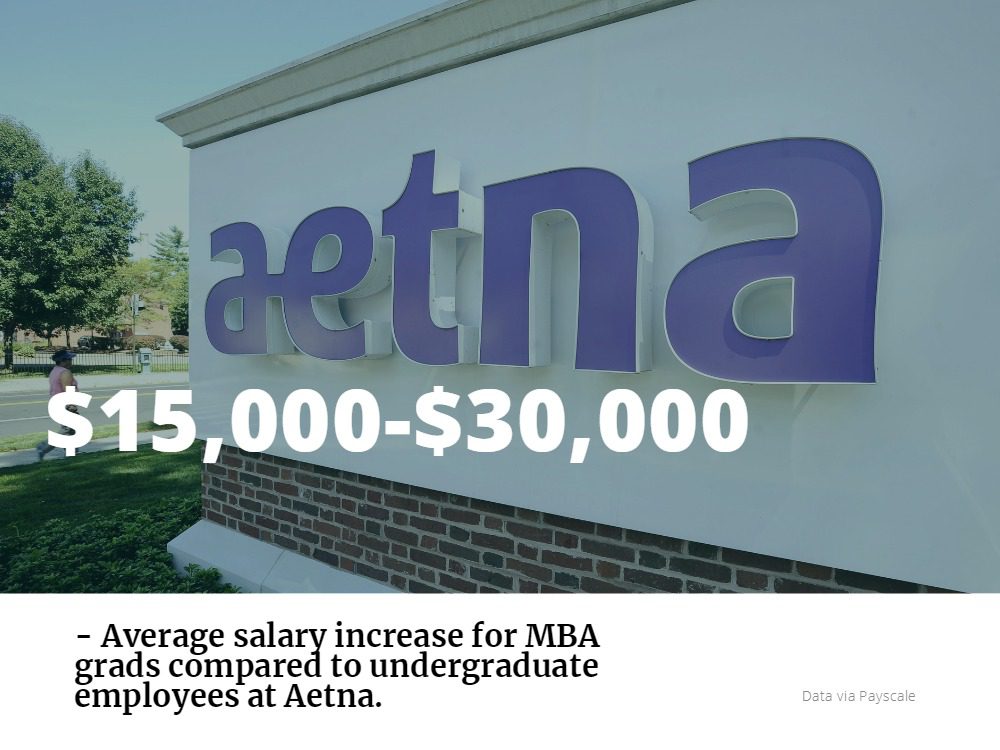
In addition, Aetna’s benefits package truly reflects the company’s strive towards healthy lifestyles. In addition to healthcare, company benefits include coverage for services like counseling, legal and financial support, employee discounts, and access to fitness centers.
Life at Aetna
Aetna offers a number of early career opportunities for recent graduates, which focus on area-specific training and providing access to a network of mentors and experienced professionals. Interested students will find development programs in a wide range of fields, including:
- Actuarial
- Finance
- General Management
- Human Resources
- Information Technology Leadership
- Information Technology Technical Training
- Sales
- Underwriting
The details of each program vary from field to field, but typically span anywhere from three to six years. Most programs also include rotations that will allow students exposure to the wide variety of opportunities open at Aetna, even within a particular area. For example, possible rotations included in the Financial Development Leadership Program include business finance, investor relations, tax, and corporate investment. After the program is completed, graduates will be placed in a full-time position, though the professional development and advancement opportunities will continue long after the program is done.
Landing an Aetna Career
Aetna is an active recruiter of MBAs and interested students should keep an eye out for professional recruiting events and career fairs throughout the country.
Each Aetna career has different requirements, but most early career programs expect applicants to have a GPA of 3.0 or higher, an undergraduate degree in a related field, strong analytical and communication skills, and the ability to succeed in a fast-paced environment.
In addition to the early career program, at the time of writing, there are 16 open jobs that require or strongly prefer applicants with MBA degrees. Below is a small sampling of the types of jobs available to MBA graduates at Aetna:
Product Strategy Manager – New Insurance Plan Design
- The Product Strategy Manager, a position for which candidates with top tier MBA degrees are preferred, will be at the forefront of decisions surrounding what healthcare is and how/where/when its delivered to those in need. According to data reported to Payscale, individuals in this role earn an average salary of $123,000 each year.
National Accounts Product & Solutions Leader
- Requiring an MBA and at least eight years of professional experience, the National Accounts Product & Solutions Director will “execute the product and solution strategy for the company in the national account employer group market” through collaboration as a member of the Large Group Solutions team.
Lead Marketing Analytics Consultant
- The Lead Marketing Analytics Consultant will use statistical predictive models to problem solve and help make decisions. The person in this role will also serve as a key contact for business stakeholders, and must be able to easily convey their predictions and recommendations to senior leadership. For this role, Aetna seeks someone with at least 7 years total business experience with an MBA preferred.
Babson Olin Graduate School of Business Names Keith Rollag New Dean
Earlier this month, the Babson College F.W. Olin Graduate School of Business named its new dean: Keith Rollag. A management professor with over 17 years of experience teaching entrepreneurial leadership at Babson, Rollag was chosen for his campus leadership and his vision for the graduate school’s future. Continue reading…
The Fastest California MBA Programs
Earning an MBA in no simple task, and takes commitment on several levels. Of course there’s the financial commitment and, for those in part-time programs, there’s also a work commitment. There’s also a large time commitment involved—prospective MBAs must sink time into studying, attending class, immersion courses, case competitions, and the like. Continue reading…
Columbia Research Identifies Customers At Risk, and More – New York City News
Let’s explore some of the most interesting stories that have emerged from New York business schools this week.
Online Companies Beware: New Columbia Business School Research Reveals That Customers With High Activity May Be At Risk Of Leaving the Company – Columbia Business School Blog
Columbia Business School professors Eva Ascarza and Oded Netzer recently published new research that explores how “customers end their relationships with companies in new and unpredictable ways.”
Professor Ascarza writes, “Companies need to understand the ramifications of this paper, because in the digital age, the landscape on customer retention has changed. Unlike the past when a consumer might have had to physically call to end a relationship with a company, today some customers are leaving without saying goodbye.”
Professor Netzer adds, “When it comes to customer retention levels, the most important thing is acknowledging that, in this new hybrid setting, there are indeed two unique types of customers who are at risk of ending their relationship with a company.”
“If businesses want to continue amassing and retaining loyal customers, they need to identify which customers belong in which bucket and then study their individual behavioral patterns so that they can take the appropriate measures to stop them before they walk out that virtual door.”
You can check out the article and the full study here.
Analytics Career Fair Draws Dozens of Recruiters to Meet Business Students – Stevens Institute of Technology School of Business Blog
The Stevens Institute of Technology School of Business Intelligence & Analytics program recently hosted a networking event in which Bed Bath & Beyond VP of Consumer Analytics Melanie Murphy spoke “with dozens of master’s students about how their analytical insights create value in business.”
Of Stevens’ Biz Intelligence & Analytics program, Murphy writes, “The program is so well balanced, from data, to different types of analytics, to the business intelligence perspective—and the students are incredibly smart.”
She adds, “You can tell, in talking with these students, that they’ve had that experience of getting in front of people and sharing ideas.”

Bed Bath & Beyond VP Melanie Murphy (right), talks with Stevens Business Intelligence & Analytics students / Photo via stevens.edu
According to the article, recruiters from Robert Half, L’Oreal, Jefferies, and UBS, among companies, “attended the event to meet and ask questions of students about their research.”
L’Oreal Assistant VP of Human Resources Information Services Gary Winant “brought in a Stevens team to examine turnover in a particular department, and use predictive tools to recommend solutions.”
He writes, “The students here come ready to work. I met with the students twice and was impressed by their commitment. We came back to them three months later with additional questions and even though the project was over, they took the time to respond in detail.”
You can read the full report from this year’s Business Intelligence & Analytics program here.
Graduate Students Provide a Helping Hand for New Business Owners – Gabelli Connect
Fordham’s recent Entrepreneurial Law Clinic was a joint effort between the Gabelli School of Business and Fordham Law, which “brought together students to work on behalf of … social ventures that seek to create positive change in society and companies founded by low-to-moderate income entrepreneurs who otherwise would be unable to afford an attorney.”
One business the Entrepreneurial Law Clinic supported was ConBody, “a boutique gym where New Yorkers learn a workout regime” its proprietor Coss Marte developed in prison. Marte, who received business training at “Defy Ventures, a non-profit that helps formerly incarcerated individuals start businesses,” got legal counseling from Fordham law students and fundraising advice from Gabelli students.
He writes, “They’re absolutely geniuses. They shot me questions that I never really thought about, and I was like, ‘Oh, I should do that.’ They were really on top of their stuff, and really hungry in helping me.”
You can check out the full piece here.






